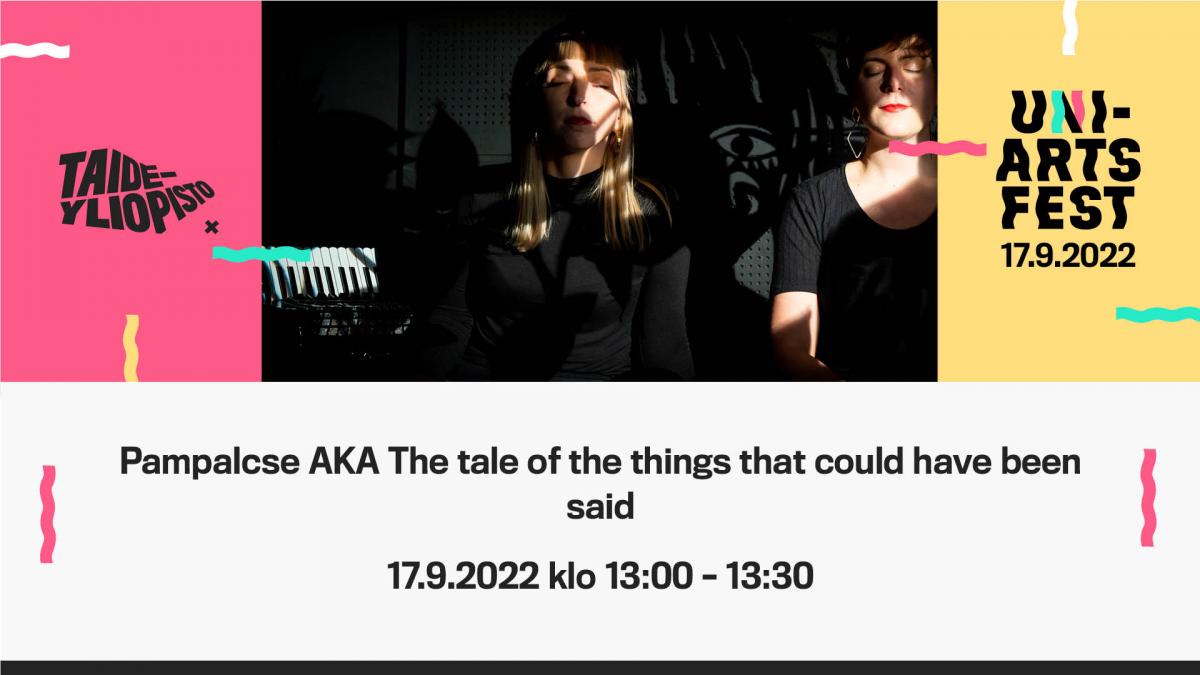Uniarts Fest: Pampalcse tells a wordless story with an accordion and puppets
Maimu Jõgeda plays the accordion and Nóri Varga manipulates puppets in their performance Pampalcse that has an eco-feminist approach. Uniarts Fest is a festival created by the Uniarts Helsinki community that showcases the skills of our young artists. This autumn, the festival will be held on the Sörnäinen campus for the first time.

Estonian accordionist Maimu Jõgeda studies at the Sibelius Academy’s Nordic Master in Folk Music programme. Hungarian theatre researcher, pedagogue and artist Nóri Varga graduated a year ago from the Theatre Academy’s Theatre Pedagogy master’s programme. Together they have created a puppet show called Pampalcse AKA The tale of the things that could have been said, which they will perform at Uniarts Fest.
Pampalcse is the heroine of the story, who faces different challenges in a patriarchal society. During her journey leading through the forest to the Underworld, she meets various characters. The encounters reveal the strength and power of the community.
“Pampalcse is suitable for both children and adults. In addition to the expressive figure theatre elements, we use traditional folk tunes and my new compositions to describe the characters and their feelings. Folk tales are often patriarchal and we wanted to expand them to include feminist and ecological approaches. There is only one word we use in the show and that is NO. It is an empowering word that teaches us to stand up for our needs. We use it in one song that we sing together to show the strength of the community,” Jõgeda explains.
Jõgeda and Varga worked together already in Varga’s master’s thesis project.
“Nóri Varga is a puppet art researcher and has participated in many puppet creation workshops. Pampalcse is her debut as a puppeteer and she created the figures herself. Puppetry and figure theatre have endless possibilities and are not just for children. In our production, we created everything ourselves, even the screen. Since we could choose the materials we used, we tried to use recyclable and natural components,” Jõgeda says.
Jõgeda started as a classical musician after which she moved on to jazz music. After about five years of jazz studies, she took up folk music. The accordion is her main instrument, but she has also studied the piano, the vibraphone and Estonian bagpipes. During her jazz studies, she became interested in improvisation and composing.
“The accordion is a rather new instrument, invented in the 19th century. Learning to play the bagpipe and arranging that repertoire for the accordion makes me feel closer to traditional music. It has inspired me to find my own sound. I have been using composition and improvisation as tools to learn and to create new music. When I perform, I play traditional tunes and my own compositions inspired by folk music,” Jõgeda says.
She studies on the Nordic Master in Folk Music master’s programme, where she was supposed to have travelled to study in Denmark, Sweden, Norway and Finland for the past two years.
“Unfortunately, due to the pandemic, many courses were moved online, including the whole semester we were supposed to be in Norway. I hope to get a chance to visit Norway soon.”
Before that, she looks forward to Uniarts Fest, which offers something for everyone.
“I would like to see the Mylly rooftop concerts. Nóri Varga would like to see the cuerpalatina show that is about empowerment of female bodies. I will also perform at a children’s concert called Muovipullopostia at 11 o’clock at the Tori,” Jõgeda says.
Show time
Pampalcse AKA The tale of the things that could have been said will be performed at Uniarts Fest on Saturday, 17 September 2022, at 1pm in Studio 1 at the Uniarts Helsinki campus in Sörnäinen.
The fourth Uniarts Helsinki art festival
The joint art festival of the Uniarts Helsinki academies was organised for the first time in Musiikkitalo in June 2019 under the name Feel Helsinki and attracted more than 5,500 visitors. During the Covid19 pandemic, the event has been organized partly in Musiikkitalo and partly virtually. This year, the event will be held for the first time on the second Uniarts Helsinki campus in Sörnäinen under the new name Uniarts Fest.